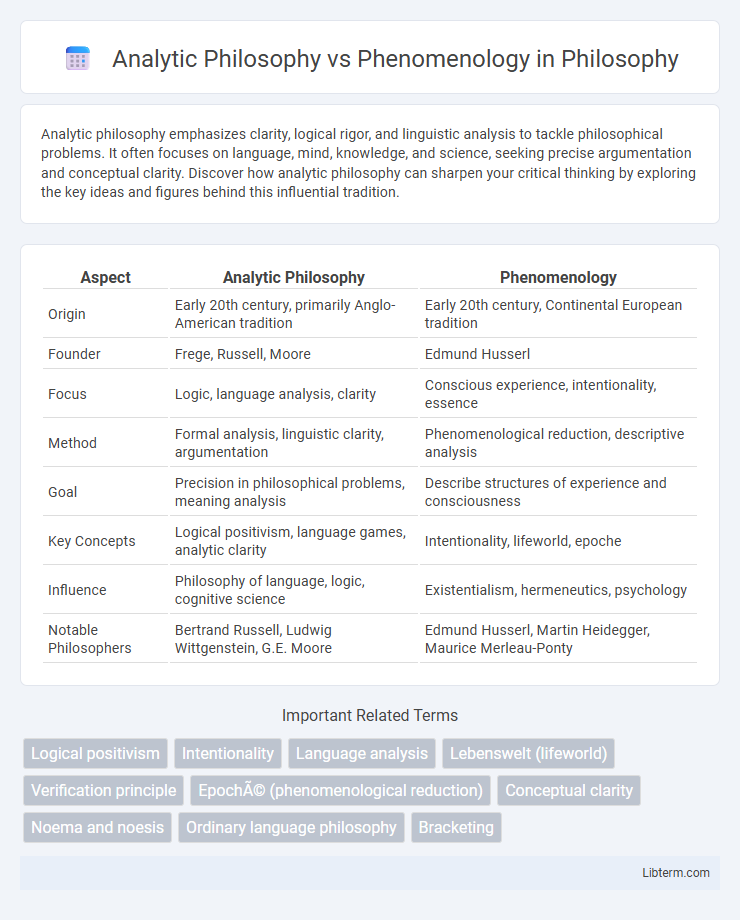Analytic philosophy emphasizes clarity, logical rigor, and linguistic analysis to tackle philosophical problems. It often focuses on language, mind, knowledge, and science, seeking precise argumentation and conceptual clarity. Discover how analytic philosophy can sharpen your critical thinking by exploring the key ideas and figures behind this influential tradition.
Table of Comparison
| Aspect | Analytic Philosophy | Phenomenology |
|---|---|---|
| Origin | Early 20th century, primarily Anglo-American tradition | Early 20th century, Continental European tradition |
| Founder | Frege, Russell, Moore | Edmund Husserl |
| Focus | Logic, language analysis, clarity | Conscious experience, intentionality, essence |
| Method | Formal analysis, linguistic clarity, argumentation | Phenomenological reduction, descriptive analysis |
| Goal | Precision in philosophical problems, meaning analysis | Describe structures of experience and consciousness |
| Key Concepts | Logical positivism, language games, analytic clarity | Intentionality, lifeworld, epoche |
| Influence | Philosophy of language, logic, cognitive science | Existentialism, hermeneutics, psychology |
| Notable Philosophers | Bertrand Russell, Ludwig Wittgenstein, G.E. Moore | Edmund Husserl, Martin Heidegger, Maurice Merleau-Ponty |
Introduction to Analytic Philosophy and Phenomenology
Analytic Philosophy emphasizes logical clarity and linguistic analysis, focusing on language, logic, and the philosophy of mind to clarify concepts and solve philosophical problems. Phenomenology centers on the direct exploration of conscious experience, aiming to describe phenomena as they appear to the subject without preconceived theories. The introduction to Analytic Philosophy involves precise argumentation and formal logic, while Phenomenology begins with the epoche, or phenomenological reduction, to study the structures of experience.
Historical Origins and Development
Analytic philosophy emerged in the early 20th century, rooted in the works of Bertrand Russell and Ludwig Wittgenstein, emphasizing logical analysis, language, and clarity. Phenomenology, founded by Edmund Husserl around the same time, concentrated on the direct investigation of conscious experience and the structures of phenomena from a first-person perspective. Both traditions diverged significantly, with analytic philosophy focusing on linguistic and logical precision, while phenomenology developed through figures like Heidegger and Merleau-Ponty to explore existential and embodied experience.
Key Philosophers and Founding Figures
Analytic Philosophy is closely associated with key figures such as Bertrand Russell, Ludwig Wittgenstein, and G.E. Moore, who emphasized logical analysis and language precision. Phenomenology, founded by Edmund Husserl, centers on the structures of consciousness and experience, further developed by philosophers like Martin Heidegger and Maurice Merleau-Ponty. The distinct methodologies reflect analytic philosophy's focus on linguistic clarity and logical rigor, contrasted with phenomenology's exploration of subjective experience and intentionality.
Core Principles and Methodologies
Analytic Philosophy emphasizes logical clarity, linguistic analysis, and formal argumentation to dissect concepts and solve philosophical problems, relying heavily on the tools of symbolic logic and language analysis. Phenomenology centers on the direct investigation of lived experience and consciousness, employing descriptive methods to reveal the structures of phenomena as they appear to awareness. While Analytic Philosophy prioritizes precision and definitional clarity through argumentation, Phenomenology seeks to uncover the essence of experience through epoche and phenomenological reduction.
Language and Meaning: Distinct Approaches
Analytic Philosophy prioritizes linguistic clarity and logical analysis, emphasizing the structure and meaning of language through formal semantics and symbolic logic. Phenomenology investigates meaning as it arises from lived experience and consciousness, focusing on the intentionality of language and the pre-reflective context of understanding. These distinct approaches reflect Analytic Philosophy's commitment to objective language analysis and Phenomenology's exploration of subjective meaning formation.
Consciousness and Experience: Contrasting Perspectives
Analytic Philosophy emphasizes clarity and logical analysis in understanding consciousness, often focusing on language and mental representation to explain subjective experience. Phenomenology prioritizes first-person experience and the intentionality of consciousness, exploring how phenomena appear to awareness without reducing them to physical or linguistic terms. These contrasting perspectives reveal divergent approaches to the nature of experience, with analytic philosophy analyzing the structure of thoughts and phenomenology capturing the richness of lived experience.
Influence on Contemporary Philosophy
Analytic Philosophy, emphasizing logical clarity and linguistic analysis, profoundly shapes contemporary epistemology, philosophy of language, and cognitive science by prioritizing rigorous argumentation and empirical verification. Phenomenology, with its focus on subjective experience and consciousness, significantly influences existentialism, hermeneutics, and embodied cognition theories, enriching our understanding of human perception and intentionality. Together, these traditions collaborate to deepen philosophical inquiry, merging analytic precision with phenomenological insight in modern debates on mind and meaning.
Major Criticisms and Debates
Analytic philosophy is often criticized for its focus on linguistic analysis and logic, which some argue neglects the richness of human experience and subjective reality emphasized in phenomenology. Phenomenologists challenge analytic philosophy's tendency to abstract away from lived experience, arguing it overlooks consciousness and intentionality as central to understanding meaning. Debates revolve around whether rigorous conceptual clarity or first-person experience provides a more valid foundation for knowledge and truth in philosophy.
Areas of Overlap and Dialogue
Analytic Philosophy and Phenomenology intersect in their mutual concern with clarifying the structures of experience and language, especially in areas like consciousness, intentionality, and meaning. Both traditions engage in detailed analysis--analytic philosophy through logical and linguistic precision, and phenomenology through descriptive examination of lived experience--creating a productive dialogue on the nature of understanding and subjectivity. This overlap fosters interdisciplinary approaches in cognitive science and philosophy of mind, enriching insights into how humans perceive and conceptualize reality.
Conclusion: Future Directions and Relevance
Analytic Philosophy and Phenomenology each offer distinct methodologies and insights valuable for contemporary philosophical inquiry, with analytic philosophy emphasizing clarity, logic, and linguistic analysis, while phenomenology prioritizes lived experience and consciousness. Recent interdisciplinary approaches are increasingly integrating analytic rigor with phenomenological depth to address complex problems in cognitive science, ethics, and metaphysics. Future relevance lies in fostering dialogue that bridges their epistemological strengths to advance a more comprehensive understanding of human experience and knowledge.
Analytic Philosophy Infographic

 libterm.com
libterm.com